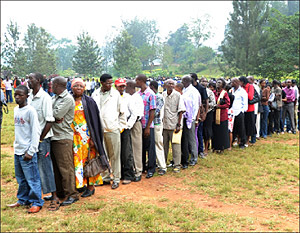The Chamber of Deputies is considering a bill determining the functioning of local administrative entities, which is largely designed to help accelerate service delivery at the grassroots.


The Chamber of Deputies is considering a bill determining the functioning of local administrative entities, which is largely designed to help accelerate service delivery at the grassroots.The bill is one of the proposed legal instruments that have been tabled in the Lower House as the country enters the third phase of the decentralization programme – designed to relinquish more powers to lower levels of governance.The chamber’s Standing Committee on Political Affairs and Gender, last week, started debating the draft law which will redefine the responsibilities of Kigali City, districts, sectors, cells and villages.It is hoped that, once enacted into law, the legislation will help streamline operations at these administrative entities as well as empower lower organs to serve the people better.Speaking to The New Times after a parliamentary session about the proposed decentralisation reforms, the Mayor of the City of Kigali, Fidel Ndayisaba, said that the reforms will bring "quality and quicker service delivery closer to the people.”"It will empower lower institutions in local government and particularly improve service delivery because people will access them much more easily,” he said.He added: "This bill is giving grassroots authorities more responsibilities and it harmonises several activities, including at the level of the City of Kigali. It’s really about fine-tuning things, according to the experience we have.”"There are some lessons learnt. We have discovered that some services which were provided at upper levels may comfortably be delivered at the lower levels,” Ndayisaba said, adding that lower entities will also "be able to engage in development activities.”Oswald Burasanzwe, a legal expert with the Ministry of Local Government, told The New Times this week that the draft law will as well promote accountability and streamline recruitment procedures at the local government level.For instance, he said, members of the district executive committee (mayor and the two vice mayors) will be more accountable to the council – the equivalent of the board of directors for corporate bodies. The council is meant to enforce checks and balances on local government entities. That organ exists at the level of the City of Kigali, all the districts, sectors and cells."Members of the executive committee must be answerable to the council in the same way cabinet ministers appear before parliament to explain about what they do and respond to issues concerning their respective dockets,” Burasanzwe said."One of the adjustments is on the recruitment procedures. The new practice is that the executive committees will be fully in charge of recruitment of employees, without necessarily seeking approval from the (advisory) council, he said, adding that the current arrangement bogs down the process since the council sits once in three months."We are looking at bringing in more clarity with regard to responsibilities.”It is understood that the current arrangement often creates friction between the executive committees and councils, which hurts service delivery and the people in the process.But the new arrangement will mean that the executive committee will fully be in charge of the day-to-day affairs of their respective administrative entities, with the councils playing the role of oversight."Now, if they have to recruit they do not need to wait for three months or for extraordinary sessions of the Council.”Under the new reforms, sectors will likely be allocated more funds and have the number of their staff increased to help improve and expedite service delivery at the community level, Burasanzwe told The New Times yesterday.This is the third time the law on administrative entities is being reviewed as the government gradually entrenches decentralization programme, which has been in place for slightly more than a decade.The first phase was between 2001 to 2005, while the second ran from 2006 to 2010.The first phase was characterized by the revision of the territorial administration entities of the country (143 communes were reduced to 92 districts and 14 municipalities), while the second one saw the number of provinces, including Kigali City, reduced from 12 down to five.According to a concept note explaining the rationale for the current review, research carried out in the City of Kigali shows that having a council at each of these administrative entities caused some problems.These, as noted, include the fact that some of the decisions taken by the districts are different from the wishes of the City; and some responsibilities are conflicting between the two entities.As noted, in order to solve such problems, it is necessary that the city is managed as a whole to allow it to meet international standards and that the capacities of staff and resources are put together rather than being scattered in different entities.By and large, the objective of the third decentralization phase (2011-2015), is to find solutions to these problems, especially by revising some administrative organs at different levels of the territorial administration as well as their responsibilities. This includes revising various laws governing territorial administration entities, from the Province or City of Kigali, down to the Village level.


